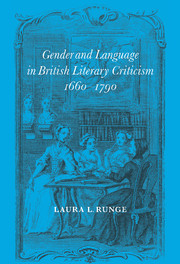Crossref Citations
This Book has been
cited by the following publications. This list is generated based on data provided by Crossref.
Bahar, Saba
2002.
Mary Wollstonecraft’s Social and Aesthetic Philosophy.
p.
13.
Prescott, Sarah
2003.
Women, Authorship and Literary Culture 1690–1740.
p.
39.
Weiner, Stephanie Kuduk
2005.
Republican Politics and English Poetry, 1789–1874.
p.
1.
Schellenberg, Betty A.
2005.
The Professionalization of Women Writers in Eighteenth-Century Britain.
Cannan, Paul D.
2006.
The Emergence of Dramatic Criticism in England.
p.
19.
2007.
A Companion to the Eighteenth-Century English Novel and Culture.
p.
18.
Schellenberg, Betty A.
2007.
Writing Eighteenth‐Century Women's Literary History, 1986 to 2006.
Literature Compass,
Vol. 4,
Issue. 6,
p.
1538.
Bowers, Toni
2007.
Gender Studies and Eighteenth‐Century British Literature.
Literature Compass,
Vol. 4,
Issue. 4,
p.
935.
Ritchie, Fiona
2008.
Women and Shakespeare in the Restoration and Eighteenth Century.
Literature Compass,
Vol. 5,
Issue. 6,
p.
1154.
Terry, Richard
2010.
The Plagiarism Allegation in English Literature from Butler to Sterne.
p.
117.
Ingham, Arleen M.
2010.
Women and Spirituality in the Writing of More, Wollstonecraft, Stanton, and Eddy.
p.
43.
2012.
The Sexual Life of English.
p.
117.
2012.
The Sexual Life of English.
p.
3.
2012.
The Sexual Life of English.
p.
137.
2012.
The Sexual Life of English.
p.
195.
2012.
The Sexual Life of English.
p.
175.
2012.
The Sexual Life of English.
p.
29.
2012.
The Sexual Life of English.
p.
245.
2012.
The Sexual Life of English.
p.
57.
2012.
The Sexual Life of English.
p.
83.





